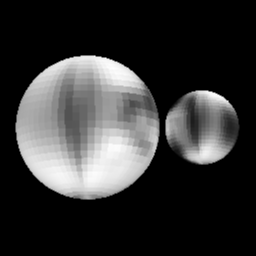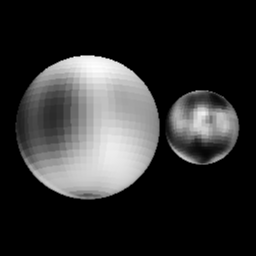 Sub-earth latitude = 10 degrees, longitude = 10 degrees.
The face of Pluto you see here is the hemisphere that always faces Charon.
At the same time, you are seeing the side of Charon that faces away
from Pluto. Get image
Sub-earth latitude = 10 degrees, longitude = 10 degrees.
The face of Pluto you see here is the hemisphere that always faces Charon.
At the same time, you are seeing the side of Charon that faces away
from Pluto. Get image
There are four views of Pluto and Charon (displayed side-by-side, not in proper orbital configuration). Pluto's north pole is at the top of the image and each panel shows the two object rotated by approximately 90 degrees. The actual latitude and longitude of the sub-earth point is shown next to each image. This work is based on photometric observations of Pluto taken between 1954 and 1986.
Pluto and Charon are completely tidally locked in their orbit around one another. Standing either on Pluto or Charon, you would always see the same face if you are on the side toward the other body. The hemisphere that faces Charon is centered on 0 degrees longitude. 180 degrees longitude is the other side. The squares you see in the maps are not real (these aren't farm plots on Pluto) but are caused by the computer processing done to create the maps of the surface.
 Sub-earth latitude = 10 degrees, longitude = 10 degrees.
The face of Pluto you see here is the hemisphere that always faces Charon.
At the same time, you are seeing the side of Charon that faces away
from Pluto. Get image
Sub-earth latitude = 10 degrees, longitude = 10 degrees.
The face of Pluto you see here is the hemisphere that always faces Charon.
At the same time, you are seeing the side of Charon that faces away
from Pluto. Get image
 Sub-earth latitude = 12 degress, longitude = 95 degrees.
On the left side of the Pluto image is the Charon-facing hemisphere. The
bright streak at the south pole of Pluto is a bad spot in the map. This
side of Pluto is much darker than the rest. At this view, Pluto is 30%
darker than on its brightest side. Get image
Sub-earth latitude = 12 degress, longitude = 95 degrees.
On the left side of the Pluto image is the Charon-facing hemisphere. The
bright streak at the south pole of Pluto is a bad spot in the map. This
side of Pluto is much darker than the rest. At this view, Pluto is 30%
darker than on its brightest side. Get image
 Sub-earth latitude = 9 degrees, longitude = 281 degrees.
In this picture, the Charon-facing hemisphere of Pluto is pointed to the
right. This is about as bright as Pluto gets. Get image
Sub-earth latitude = 9 degrees, longitude = 281 degrees.
In this picture, the Charon-facing hemisphere of Pluto is pointed to the
right. This is about as bright as Pluto gets. Get image
 Sub-earth latitude = 10 degrees, longitude = 172 degrees
This view shows the side of Pluto that faces away from Charon and the
side of Charon that faces Pluto. Get image
Sub-earth latitude = 10 degrees, longitude = 172 degrees
This view shows the side of Pluto that faces away from Charon and the
side of Charon that faces Pluto. Get image
Feel free to use these images as you like. The only request I have is that if you use or otherwise publish any of these images in any public format (such as WWW pages or printed materials) that you include the following credit line: "Image(s) courtesy of Marc W. Buie/Southwest Research Institute".
Marc W. Buie, Southwest Research Institute